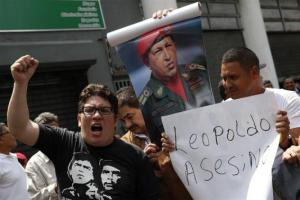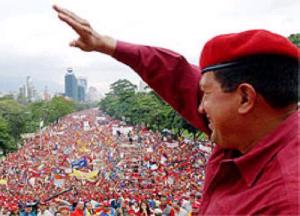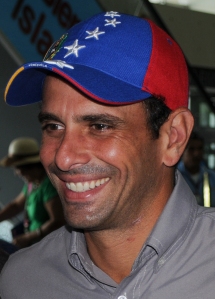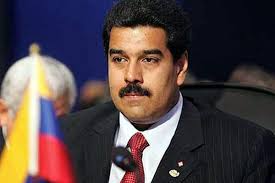There is no doubt right now that Venezuela is embroiled in a clash between government and opposition, and that a country already besieged by high homicide rates is beginning to see an unparalleled level of violence in recent weeks. There is no doubt that both sides can only view this as bad, and bringing an already economically fragile country to the brink of ruin(although the owners of private capital might indulge in some schadenfreude were the economy to collapse, hailing it as something akin to the decimation of the USSR economy in the late 1970s which saw a fiercely communist government relenting before a wave of privatisation and price mechanism reforms). However, in my opinion, this is not the right way to go, and in fact, i hope the current government does survive this wave of protests…but not for the reasons you might think.

This is not a typical story of ‘big bad wolf’ government vs the people. This is very much one social class(the middle class professionals and small business owners) militating against the interests of another social class represented by the government(the workers)
There is no doubt that elements of the old regime of the upper classes were behind agitating the 2002 coup, some might say in an undemocratic fashion, and despite opinions which state otherwise, Venezuela entertains a strong anti-government media presence although US media outlets often play that fact down. However, what is different between that coup and now is that whilst that was very much action engineered by a small elite who felt excluded in the new socialist order, these are evidently protests with a much stronger middle class backing, and hence, something which suggests a disaffection creeping across all the class lines. In my opinion, people can say what they like about Chavez, but there is no doubt that he helped lift thousands of marginalised workers and farmers out of squalid poverty, and emphasised their importance in society like no governments previously had ever bothered with. What Maduro must now realise though is that the first part of the socialist mission is now done, the sharp transition to liberal democracy has to begin immediately.

The US might like to bash Chavez as a socialist dictator, but they ignore the fact he was democratically elected in, primarily because the previous social order had alienated so many impoverished Venezuelans that socialism became a reaction to the injustices of the last regime. Even his most ardent critics must admit that he did aid many of those who voted him in, and the love was mutual to an extent. His biggest fault however was creating a new class of legitimate grievance holders in the middle class who desired more freedom as the state increased in size to match the aspirations of its President.
Just as the working class of the old order were previously neglected socially due to a lack of investment in education and healthcare, so too are the current middle classes being neglected by Maduro in terms of the certainty of rule of law, the ability to protest and the basic guarantees of the capacity to form small and medium-sized private businesses to feed themselves and inject the economy with much needed production and incentive mechanisms which the private economy delivers best in order to force down rampant inflation rates. For me personally, I think Venezuela is much better off without relying on foreign corporations exploiting its natural resources and corrupting the government from the outside, whilst forcing the populace into a state of servitude. However, it is no better when that corruption and oppression is home-bred either, thus, it is up to Maduro to deliver the reform people need and trust the skill and energy of the Venzuelan people in producing their own goods and driving the economy forward on the steeds of innovation and imagination, traits which the individual possesses much more so than the state. Any form of corporation is bad, whether it be the state corporation or foreign corporations.

Capriles represents the next logical stage for Maduro to ensure that the compassion Chavez showed to a marginalised class does not turn into a dictatorship which excludes the middle class from the dream of prosperity. Capriles represents that disaffected group who aspire to liberal values of rule of law and freedom of expression, as well as the desire to own small forms of private enterprise. Even if Capriles didn’t win the elections, those people CANNOT be ignored…democracy doesn’t stop at the ballot box.
For me, as a person who has some roots in South America(a few uncles here and there), I cannot truly understand every little piece of history which is going on there…but there is no doubt that the multiple socialist governments which have risen in Latin America is not due to ignorance by the populace, it is not due to military force being used to prop up anti-colonialist dictators, it is rooted in a deep, and justifiable distrust of the control of means of production by a select few aristocrats who lacked the imagination and empathy to help the oppressed and marginalised within their societies. What must be realised however, is that aristocrats in extravagant robes and splendid mansions are just as bad as aristocrats in military uniforms and red berets. The state cannot become the very corporation it sought to dismantle.

The future of Venezuela is in Maduro’s hands now. Will he resist the very change which once launched his own political father, Chavez into power, and allow the cycle of violence and class strife to continue to eat away at Venezuela for generations to come, or will he allow all Venezuelans to seize their destiny, affluent and impoverished, and relinquish the tight reins his government has held on the means of economic production and the judiciary?
For me personally, I think Maduro will do too little too late, and the ticking time bomb that is the economy might just eat away at his support base in the workers who do actually support his government of their own free will, not because they were ‘bribed’ by Chavez with social missions and free healthcare, but because for the first time in a long time, they were treated as equals in society under his rule. If the opposition wins without understanding this plight, and realising the good Chavez actually did, then the cycle continues, and in ten years time, the injustice of the workers will become just as apparent as the injuries currently inflicted onto the middle class. Only through the synthesis of liberalism and humanism will not only a stable government, but a healthy prosperous society be cultivated.
Here’s hoping that both sides finally see reason and that the violence and chaos stops once and for all.